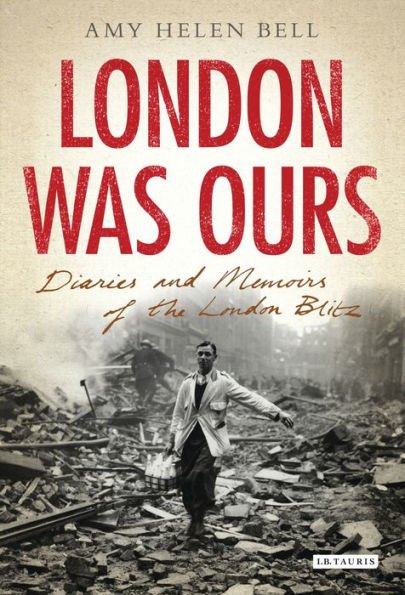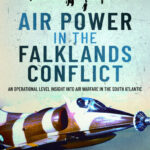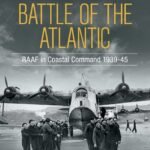
Three blitzes: the German Blitz on Britain (well, London); the British Blitz on Germany; and the robot Blitz on Britain.
Amy Helen Bell, London Was Ours: Diaries and Memoirs of the London Blitz (London: I. B. Tauris, 2011). I got a lot out of reading this excellent book. At least, I hope I will this time — because it was not until I finished it that I realised that I actually read it two years ago, and took over a thousand words of notes! Despite that, I still have utterly no memory of having read it the first time. (I blame the pandemic, obviously.) Bell has assembled an impressive collection of diaries, letters, and memoirs written by people who lived through the Blitz, trawling not only the usual suspects like Mass-Observation and the IWM, but the Burnett Archive of Working Class Autobiographies and local libraries and heritage centres. She uses these sources to draw out what life was like under the bombs through various themes: again including the obvious stuff like raids, civil defence, rationing, but also love and sex, families and children, and ending up on the memory of the Blitz. The resulting picture is (no surprise), far more complicated than the Blitz spirit uniting all Londoners, but nor is she just out to destroy comforting myths, either. I would take issue with some of Bell’s claims — I don’t think the Blitz was as unique an experience for Londoners as she does, but then I would say that, wouldn’t I — but there’s lot of great stuff to think with here, such as the way that the city was made uncanny by the destruction and darkness, or the explicit appeal to Surrealism as a comparison when trying to describe half-shattered houses and so on (a comparison which definitely was not available in the previous war). Worth reading twice!
Will Iredale, The Pathfinders: The Elite RAF Force That Turned the Tide of WWII (London: WH Allen, 2022). This was heavily marketed, seems to have sold well and clearly is something that would appeal to airport dads — but it’s definitely better than that sniffy summary would suggest. For one thing, Iredale has carried out serious research in the TNA, IWM and IBCC, and he’s found a lot of great personal narratives from Pathfinder aircrew to tie together the necessarily more impersonal story of why the Pathfinder Force was created and how it worked (I think it’s fair to say to say the title claim that it ‘turned the tide of WWII’ is not really sustained, but then it would be a difficult thing to prove). It’s an engaging read, with lots of vivid details (e.g. when a Pathfinder bomber was shot down the coloured incendiaries it carried would all go off as it tumbled down, hence the main force crews called them ‘pretties’, 266). However, neither aspect quite worked for me. The experience of the Pathfinders as Pathfinders was just not different enough from that of regular Bomber Command aircrew for the personal narratives to be very different from those found other Bomber Command books, or at least those differences don’t come through very clearly. And while there is a fair bit about the development of navigational aids and target marking techniques, this is not the book to go to for a raid by raid analysis of how the Pathfinder Force fared, nor is there a clear picture given of how it worked as an organisation. Having said that, Iredale is very good on the relationship between Bomber Harris and Don Bennett, the head of the Pathfinders, which gave me a considerably more jaundiced view of the former than I’d gained after reading Probert’s biography. I would have liked a discussion of Bennett’s vision of an international air (and and sea) force to keep the postwar peace, particularly given that he was on the far end of right-wing himself (or at least became so in his later years; he was elected as a Liberal in a 1945 by-election). But that’s probably just me.
Roy Irons, Hitler’s Terror Weapons: The Price of Vengeance (London: Collins, 2002). I don’t know a lot about the V-1 and V-2 campaigns against Britain (certainly not as much as I should) and I should have read this much earlier than now. Unfortunately I found it to be a somewhat curious book. That’s not to say it’s all bad: it’s based on considerable research and Irons has a lot of interesting things to say about, for example, the weakness of the morale concept when applied to civilians (as opposed to soldiers), and he absolutely nails the vagueness of thinking through exactly how a civilian morale collapse would end a war (that is to say, the core conceit behind the knock-out blow from the air). There are masses of technical data and statistics about the German development of the V weapons as well as the corresponding British intelligence and countermeasures; and there’s a good chapter on their effect on British morale, nebulous though that may be. So why did I find it curious? Well, there is a lot of padding for what is not a long book (186 pages plus appendices): you get a chapter on Germany’s defeat in 1918, the Freikorps era, the rise of the Nazis; there are long passages on Barbarossa, the war in the Pacific, etc; and a lot of speculation about Hitler’s psychology and motivations (plus an X-ray of Hitler’s skull with the comment that ‘the seeds of vengeance […] were sown here on the 9th of November, 1918′! Anyway, surely the vengeance here was for RAF bombing, not 1918). Most of Irons’ footnotes cite TNA (or PRO, as was), which is fine for the British side of the story, but most of the German side is told from TNA files as well. Since all he usually gives are bare TNA references with no identifying information, it’s impossible to tell if these are contemporary intelligence, captured German files, interrogation of POWs, or what. The prose can tend to the purple and portentous (though to be fair, I would not be above using a chapter title like ‘The Doom of London’ myself). And he’s been let down by the publisher, too: far too many typos for comfort (and they may well have been responsible for the X-ray, too, now that I think of it). It looks like this may have been an excellent MA thesis stretched to fill a book; there’s a lot that is interesting and useful in it, but you’ll need to carefully sort the wheat from the chaff.
![]() This work is licensed under a Creative Commons Attribution-NonCommercial-NoDerivatives 4.0 International License.
Permissions beyond the scope of this license may be available at http://airminded.org/copyright/.
This work is licensed under a Creative Commons Attribution-NonCommercial-NoDerivatives 4.0 International License.
Permissions beyond the scope of this license may be available at http://airminded.org/copyright/.






On the V-weapons, what did you make of Campbell’s _Target London_? I vaguely recalled you mentioning it, but a cursory Google suggests it may have just been an acquisition post rather than anything else. I thought it was rather good on the intelligence apparatus machinations behind the scenes on the British side.
No, I haven’t read it yet! But I estimate an approximately 1 in 4 chance that I’ll read it by the end of the year :)